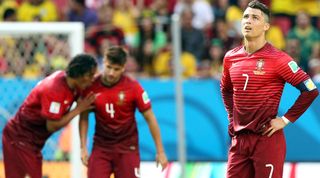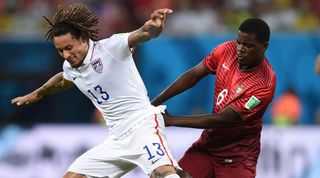Year Zero: Ronaldo keeping Portugal afloat for now – but big trouble lies ahead
The Seleção were humbled in Brazil, and with chances severely restricted for the kids back home, Tom Kundert suggests their biggest worries are still to come...

Portugal’s abject performance at the World Cup led to fierce criticism back home. Nevertheless, the damning words in the Portuguese media fell short of calling for a major overhaul, as we routinely see in the English press following each failure of the Three Lions.
The chief culprit of a forgettable performance was almost unanimously identified as coach Paulo Bento, whose lack of flexibility, zero tactical variation and blind loyalty to the old guard were cited as factors explaining the Seleção’s failure. The Portuguese Football Federation also came under fire for the way the squad had been prepared – or not, specifically – for the tournament.
The need for long-term structural changes was timidly mooted in some quarters (more of that below), but the blame game for the Brazilian meltdown was very much about the here and now.
Luís Figo, Rui Costa and Deco are examples of phenomenal talents Portugal have boasted over the past decade-and-a-half, but never throughout this golden period for the Seleção has the chasm in quality between the country’s star man and the rest been as glaringly evident as it is today. This is partly because Cristiano Ronaldo is well on his way to establishing himself as the country’s greatest player of all time.
Get FourFourTwo Newsletter
The best features, fun and footballing quizzes, straight to your inbox every week.
But it is no less true that the supporting cast is not of the same vintage as recent years. The likes of João Pereira, Raul Meireles, Miguel Veloso and any one of three woeful strikers on show at Brazil 2014 would never have been starters in Portugal teams of the recent past – at least not on current form.
One man band
The result? An all-consuming Ronaldo dependence. As much as appreciators of Portuguese football tried to convince others that the present Seleção were not a one-man band, all evidence pointed to the contrary.
Truth be told, if it was not for Ronaldo, Portugal would not have qualified for the tournament at all; his individual destruction of Sweden propelled his nation to a play-off win. Earlier in the group phase, another CR7 hat-trick against Northern Ireland had also made a play-off spot achievable in the first place.
While Bento has done a fine job getting the most out of Ronaldo, it has come at a cost. Critics have rightly pointed to his absolute failure to come up with anything resembling a Plan B. This one-track-mind philosophy is also evident in Bento’s inability to introduce new blood into the Seleção.
He largely refused to experiment with younger alternatives in friendlies and was reluctant to replace his trusted charges with players who had enjoyed stellar seasons (Sporting’s Adrien and Porto’s Ricardo Quaresma come to mind). That's not to mention his inexplicable decision not to start William Carvalho, Portugal’s most in-form midfielder, until it was too late.

But Bento can also point to a shrinking pool of options from which to select from. The problem is not a lack of talent emerging at youth level: Portugal Under-21s are waltzing through their European Championship qualifying group having won six games out of six, scoring 17 goals in the process.
Portugal’s U19s were top scorers in qualifying for the Hungary 2014 European Championship which has just started, and are heavily fancied to do well in it. Benfica, meanwhile, reached the final of the inaugural Champions League youth tournament.
No room for local talent
The problem lies in turning an abundance of potential into the finished article. Portuguese club sides, Sporting apart, loathe to put their trust in home-grown players. When Benfica hosted Porto in the blue ribbon Primeira Liga fixture in January, only two of the 22 starters were Portuguese. That was one more than in the corresponding fixture the previous season.
The summer transfer market has seen another influx of foreigners into Portugal, further squeezing the opportunities for local players. To renew itself, the national team will almost certainly have to turn to young Portuguese players plying their trade abroad: that's the likes of Galatasaray’s Bruma, Udinese’s Bruno Fernandes or Lyon’s Anthony Lopes.
The conclusion? With a player of Ronaldo’s almost superhuman abilities, Portugal will likely qualify for every tournament as they have done since the year 2000, and perhaps even add to their record of three semi-finals and one final in that time.
But when the Madeira magician’s powers finally wane, Portuguese football could face a nasty wake-up call, thus triggering serious debate about the need for major changes after all.
SEE ALSO IN YEAR ZERO
- How Germany restructured itself – and why it couldn't work elsewhere
- Brazil may want to copy trendy European models, but they can't afford to
- Spain need pruning, not root-and-branch reform
- Italians just want a new coach, not new methods after dismal World Cup
- Klinsmann given time to work quietly as 'soccer' returns to middle pages

Thank you for reading 5 articles this month* Join now for unlimited access
Enjoy your first month for just £1 / $1 / €1
*Read 5 free articles per month without a subscription

Join now for unlimited access
Try first month for just £1 / $1 / €1
